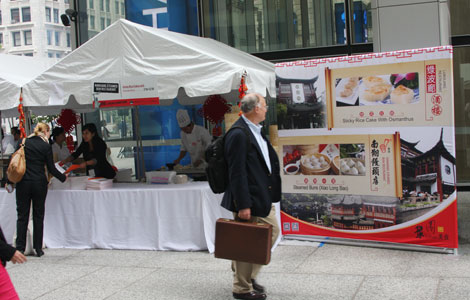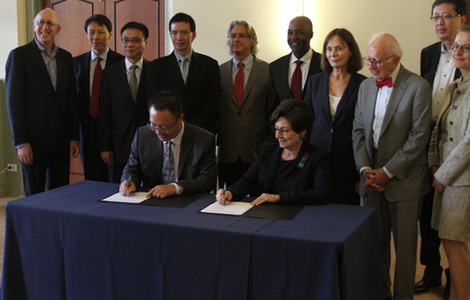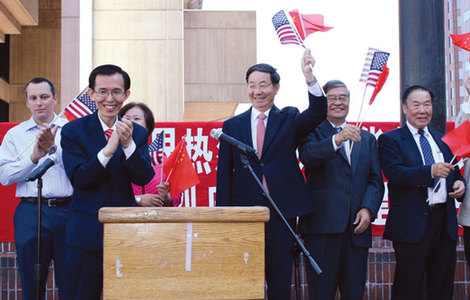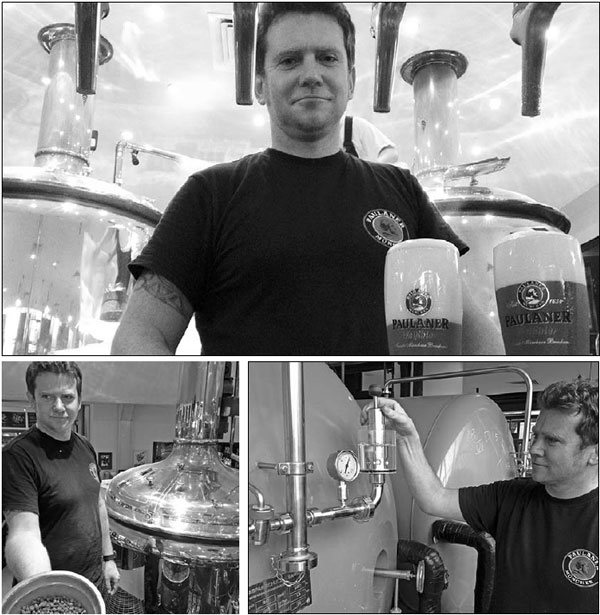Beer hug
Updated: 2014-10-01 07:59
By Mike Peters(China Daily USA)
|
|||||||||
A German master brewer has made China his home, serving up some glasses, distinct in their northern and southern tastes. Mike Peters reports.
There's an old punch line, popular on T-shirts at college campuses, that goes, "Beer: It's not just for breakfast anymore."
And then there's Wolfgang Sesser, who sees his first beer of the day before dawn.
|
Wolfgang Sesser takes charge of the brewing process at the Paulaner restaurant of Beijing's Kempinski hotel. Photos by Mike Peters / China Daily |
"Today I am making lager," says Sesser, 39, arriving in the brewing room of the Paulaner restaurant at Beijing's Kempinski hotel around 5:15 am. "Tomorrow I will be making the year's first batch of Oktoberfest beer."
The German expat's early-morning chore is a "mash in", putting malt extract into the water for a day of cooking, first at 55 C and then gradually hotter.
"The brewing or cooking takes six hours, so we can make two batches every day," he says, manipulating temperature controls at the base of two huge copper kettles that each hold about 1,000 liters of "baby beer".
After cooling at day's end, the beer will be piped to fermentation tanks a few meters away, where the alchemy of yeast, malt and water will break down starch into smaller sugars over the next week.
Finally, the beer will be stored for between one and three weeks. The turnover is faster in the summer, when the flow from the brewery's big green storage tanks is fastest, but the beer is better in the winter, Sesser says, when it's allowed to stay a little longer.
Born in Mondsee, Austria, a small village near Salzburg, Sesser has called Beijing home since 2011, but it happened indirectly.
"My wife is a Beijinger, but we met in South Korea," he says, when he was working in a hotel handling the sales side of beer.
The master brewer has lived in Asia for a decade already. He left South Korea after staying there for three years for stints at HB Munich in Shanghai before moving to Nanjing for another three years to brew beer for Kempinski both in the old southern capital and in nearby Wuxi city.
Sesser has learned to adjust the way he makes beer as he's moved north in China.
"In Nanjing, 70 percent of the beer we make is dark beer," he says. "It has a novelty appeal for Chinese drinkers, I think they coming looking for something special, something different, and dark beer has a stronger, more robust character."
In Beijing, however, the ratio is reversed.
"Here, 75 percent of what we sell is lager, light beer. I think that's perhaps because when the Kempinski opened in the capital 22 years ago, the light beer was promoted as original Munich beer, and it was a closer fit for Chinese tastes."
Another difference: In Jiangsu province, the beer is made sweeter and is lesser fermented. The ingredients don't change. The brewers simply allow less of the natural sugar to convert to alcohol, he says.
"If I served that beer here," he jokes, "people would ask why I'm giving them lemonade!"
A local taste concession his team of brewers never makes: No rice is added to the recipe, unlike in Asian beers such as Tsingtao and Asahi.
"We adhere to the old German law of purity," he says, "which means beer can only contain malt, hops, yeast and water".
It's not an issue. Sesser says: "Our customers are coming here to drink authentic German beer, whether they are foreigners (who dominate the lunchtime crowd) or Chinese (the majority at dinnertime)."
Using different kinds of malts, including some roasted varieties, and varying the cooking and fermenting procedures give brewers like Sesser plenty of creative latitude to produce a pleasing selection of beers, including the seasonal Oktoberfest.
The very word makes him smile.
"Munich people can't live without it - my friends there go every single day. There's no normal life during those two weeks," he says, comparing the atmosphere to China's Spring Festival celebrations.
In other parts of Germany, and in his Austrian hometown 140 kilometers east of Munich near the border of Bavaria, Oktoberfest casts a smaller shadow, he says. While many German communities seize the opportunity to make money and join the fun, the festivals tend to last over a weekend.
But the Munich party draws fans from all over, he says.
One is a good friend of Sesser's, originally from Munich, who lived in Beijing for 20 years. " He always took his vacations in Munich during the Oktoberfest, then came back to Beijing to enjoy the Oktoberfest parties here!" He's now retired, Sesser says, and no prizes for guessing where the friend lives these days.
The German embassy has traditionally brought a group of its Chinese followers on Sina Weibo to the Kempinski hotel for a night of the festivities, and German businesses entertain many Chinese customers there as well.
The Oktoberfest at Beijing Kempinski runs from Oct 10-26.
Sesser's own beer-drinking habits have changed with time.
"I started in the beer business late, in my 20s, as a buyer not a brewer. When I started making it, I enjoyed learning the background," he says.
The job makes you appreciate beer quality more, and the differences, he adds. "Young brewers tend to embrace darker and stronger beers. As I get older, I drink less - I have more sense! But I also take more pleasure in savoring a good beer in the mouth."
Meanwhile, there is work to be done. Sesser watches as his colleagues scoop pellets of powdered hops into the vast beer kettle, then clamber down a two-story-tall ladder back to the control panel on the ground level.
Soon he takes a break, offering his visitor a tall, thin glass of light wheat beer, a summer treat he won't be making much longer.
"Weissbier," he sighs. "It's like milk in the morning."
Contact the writer at michaelpeters@chinadaily.com.cn
(China Daily USA 10/01/2014 page8)

 Chinese show love for country ahead of National Day
Chinese show love for country ahead of National Day
 Latest report on 100,000 Strong Initiative is discussed
Latest report on 100,000 Strong Initiative is discussed
 Dine Around Downtown returns for 13th year
Dine Around Downtown returns for 13th year
 Perfect World signs MoU with Columbia University
Perfect World signs MoU with Columbia University
 China, US bid to work together
China, US bid to work together
 Xinjiang's first high-speed railway to start operation
Xinjiang's first high-speed railway to start operation
 Ambassador's National Day greetings
Ambassador's National Day greetings
 It's time to celebrate
It's time to celebrate
Most Viewed
Editor's Picks

|

|

|

|

|

|
Today's Top News
First Ebola case reported in US: CDC
100 foreigners get Friendship Award
US firms remain optimistic about China
China marks first Martyrs' Day
Chinese, Indian troops withdraw from border standoff
China eases home purchase restriction
Protest continues in HK as bus service interrupted
Donation from Chinese group enables classes to keep going
US Weekly

|

|









